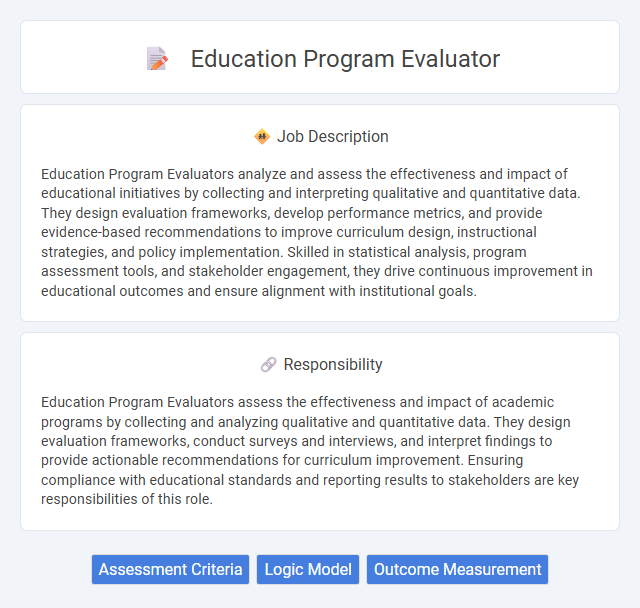
Education Program Evaluators analyze and assess the effectiveness and impact of educational initiatives by collecting and interpreting qualitative and quantitative data. They design evaluation frameworks, develop performance metrics, and provide evidence-based recommendations to improve curriculum design, instructional strategies, and policy implementation. Skilled in statistical analysis, program assessment tools, and stakeholder engagement, they drive continuous improvement in educational outcomes and ensure alignment with institutional goals.
Individuals with strong analytical skills, attention to detail, and a passion for educational improvement are likely to be suitable for an Education Program Evaluator role. Those comfortable working with data, conducting research, and communicating findings may find this job aligns with their strengths. Candidates who prefer structured environments and have a genuine interest in assessing educational outcomes could probably excel in this position.
Qualification
An Education Program Evaluator must hold a minimum of a bachelor's degree in education, social sciences, or a related field, with many employers preferring a master's degree in program evaluation or educational research. Strong skills in data analysis, statistical software, and qualitative and quantitative research methods are essential for assessing program effectiveness and outcomes. Experience in curriculum development, report writing, and stakeholder communication enhances the evaluator's ability to provide actionable insights and improve educational initiatives.
Responsibility
Education Program Evaluators assess the effectiveness and impact of academic programs by collecting and analyzing qualitative and quantitative data. They design evaluation frameworks, conduct surveys and interviews, and interpret findings to provide actionable recommendations for curriculum improvement. Ensuring compliance with educational standards and reporting results to stakeholders are key responsibilities of this role.
Benefit
Working as an Education Program Evaluator likely offers the benefit of contributing to the improvement of educational outcomes by providing valuable insights and data-driven recommendations. This role may enhance professional skills in data analysis, research methodologies, and stakeholder communication, increasing career growth opportunities. The position could also provide a sense of fulfillment by influencing educational policies and practices that positively impact learners and educators.
Challenge
Education Program Evaluators likely face the challenge of accurately measuring program effectiveness amid diverse learner needs and varying educational contexts. They probably must balance quantitative data analysis with qualitative insights to provide comprehensive evaluations. Managing stakeholder expectations while ensuring objectivity could also present ongoing difficulties in this role.
Career Advancement
Education Program Evaluators drive career advancement by leveraging expertise in assessment methodologies, data analysis, and educational theory to improve program outcomes. Proficiency in evaluation tools and strong analytical skills enable professionals to transition into leadership roles, policy development, or consultancy positions within education sectors. Continued professional development and certification in evaluation standards significantly enhance opportunities for promotion and specialization.
Key Terms
Assessment Criteria
Education Program Evaluators utilize comprehensive assessment criteria to measure program effectiveness, focusing on student achievement data, curriculum alignment, and instructional quality. They analyze quantitative and qualitative metrics such as standardized test scores, participant feedback, and engagement levels to determine program impact. Expertise in data analysis tools and educational frameworks ensures accurate evaluation and actionable recommendations for program improvement.
Logic Model
An Education Program Evaluator specializing in Logic Models systematically assesses educational initiatives by mapping inputs, activities, outputs, and outcomes to measure program effectiveness. Expertise in developing and applying Logic Models enables clear visualization of cause-and-effect relationships and identification of key performance indicators. This role involves using data-driven analysis to improve curriculum design, enhance learning outcomes, and inform stakeholder decision-making processes.
Outcome Measurement
Education Program Evaluators specializing in outcome measurement design and implement robust assessment frameworks to quantify program effectiveness and student achievement. They analyze quantitative and qualitative data to determine learning gains, behavioral changes, and long-term impacts, ensuring alignment with educational goals and standards. Expertise in statistical methods, data visualization, and stakeholder reporting is essential for translating evaluation results into actionable program improvements.
 kuljobs.com
kuljobs.com